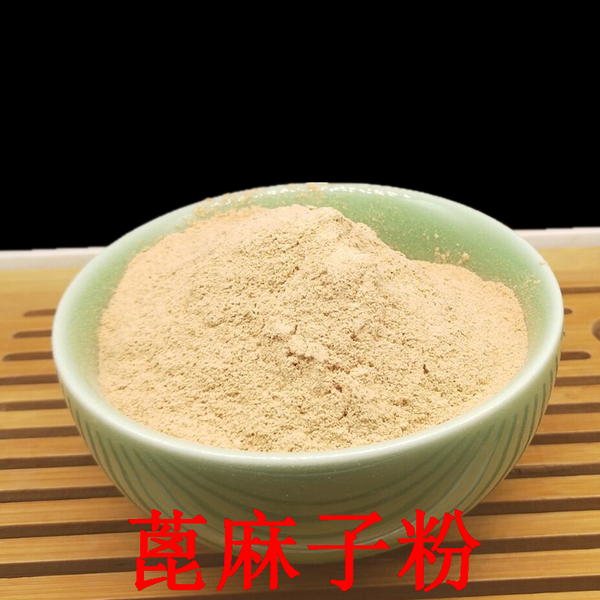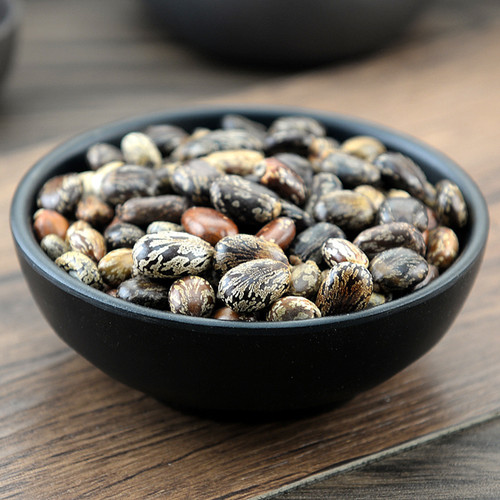Product Overview
Parts used: Dried ripe seeds
TCM category: Herbs that clear Heat and relieve Toxicity
TCM nature: Neutral
TCM taste(s): PungentSweet
Meridian affinity: Large intestineLung
Scientific name: Ricinus communis
Other names: Castor oil plant
Use of castor beans (Bi Ma Zi) in TCM
Please note that you should never self-prescribe TCM ingredients. A TCM ingredient is almost never eaten on its own but as part of a formula containing several ingredients that act together. Please consult a professional TCM practitionner, they will be best able to guide you.
Preparation: Collect ripe fruits during autumn and dry them. Then remove shells and collect the seeds
Dosage: 1 - 5 grams
Main actions according to TCM*: Induces subsidence of swelling and removes toxins. Facilitates urination and eases constipation. Clears the Meridians.
Primary conditions or symptoms for which castor beans may be prescribed by TCM doctors*: Carbuncles Boils Goiter Sore throat Scrofula Constipation Oliguria Edema Burns Traumatic swelling
Contraindications*: This herb is toxic. It should only be used under the guidance of a qualified TCM practitioner.
Key TCM concepts behind castor beans (Bi Ma Zi)'s properties
In Traditional Chinese Medicine (TCM), castor beans are plants that belong to the 'Herbs that clear Heat and relieve Toxicity' category. Herbs in this category are used to clear inflammatory and infectious conditions, referred to as 'Internal Heat' in TCM. This is why most of the herbs in this category will have both antibacterial and antiviral properties. In TCM one has too much 'Heat' in their body as a result of a deficiency of 'Yin' (which is Cold in nature, see our explanation on Yin and Yang) or, more commonly, an excess of Yang (Hot in nature). Herbs that clear Heat and relieve Toxicity treat the latter while, at the same time, removing infectious toxins from the body. As such they tend to be Cold or Neutral in nature.
As suggested by its category castor beans are plants that are Neutral in nature. This means that castor beans typically don't affect the balance in your body. Balance between Yin and Yang is a key health concept in TCM. Eating too many "Hot" (Yang) ingredients can lead to an imbalance whereby one has a Yang excess. The inverse is true as well: too many "Cold" (Yin) ingredients can lead to a Yin excess. The Neutral nature of castor beans means that you don't have to worry about that!
Castor beans also taste Pungent and Sweet. The so-called "five elements" theory in Chinese Medicine states that the taste of TCM ingredients is a key determinant of their action in the body. Pungent ingredients like castor beans tend to promote the circulations of Qi and body fluids. That's why for instance someone tends to sweat a lot when they eat spicy/pungent food. On the other hand Sweet ingredients tend to slow down acute reactions and detoxify the body. They also have a tonic effect because they replenish Qi and Blood.
The tastes of ingredients in TCM also determine what organs and meridians they target. As such castor beans are thought to target the Large intestine and the Lung. In TCM the Large Intestine receives the "impure" parts of the digested food from the Small Intestine, absorbs the remaining fluids and excrete the remainder as feces. In addition to performing respiration, the Lungs are thought to be a key part of the production chain for Qi and the body fluids that nourish the body.






